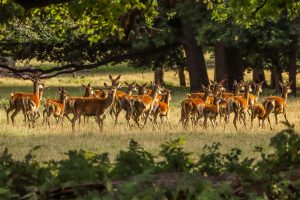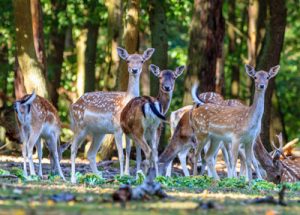Wild deer are a highly valued part of our natural heritage and are increasing in number and geographic range in the UK. Deer are a natural asset and integral to our countryside. At the same time, these positive values need to be balanced against the considerable negative impacts that deer often have on agriculture, forestry, woodlands and the wider environment.
Deer Species and Populations in the UK
Six species of deer exist in the wild in the UK and current numbers are estimated at around 2 million. Red and Roe deer are the only native species, however Fallow deer have long been established in the UK, having been introduced around the 11th century or possibly earlier. Sika, Muntjac, and Chinese water deer (CWD) have all been introduced in the past 150 years.
These six species differ in their geographic distribution, numbers, population growth rate, behaviour, and impact on the environment.
- Red deer – population estimate 350,000. The Red deer is native to the UK.
- Sika deer – population estimate 35,000. Japanese Sika were introduced from the Far East in 1860.
- Fallow deer – population estimate 200,000. Fallow were introduced from the Mediterranean in 11th
- Roe deer – population estimate 800,000. The Roe is native to the UK.
- Chinese water deer (CWD) – population estimate 10,000. CWD were introduced from China in 1873.
- Muntjac deer – population estimate 150,000. The Muntjac was introduced from China before 1900.
It is believed that deer are now more abundant and widespread than at any time in the past 1,000 years. Estimating deer number is challenging as deer are secretive animals and roam freely making them difficult to accurately count.
 The rapid increase in deer numbers occurring in recent times is due to:
The rapid increase in deer numbers occurring in recent times is due to:
- no natural predators (bears, wolves and lynx, long extinct in the UK)
- increased woodland cover
- milder winters leading to improved deer fertility
- changes to agriculture, such as an increased area of winter crops
- escape from parks and farms
The Impact of Wild Deer
While deer are a highly valued part of our natural heritage and bring many benefits (not least a valued source of healthy food), deer can have a negative impact on agricultural land and woodlands/forest. Impacts to consider are:
- agricultural and horticultural crop damage
- damage caused by deer to plantations and woodlands
- 74,000 road traffic accidents each year, some of which result in human injuries or fatalities
- damage to semi-natural habitats and biodiversity values
- damage to woodland plants and additional costs of protecting trees from deer
- infection with diseases which can affect farm livestock and in some cases humans
- damage to gardens
Effective Deer Management
The only effective way of managing the Uk deer population is by culling. An estimated 350,000 deer are culled each year, for the most part by part time recreational deer stalkers.
Maintaining our deer population at a sustainable level essentially maintains a healthy population and reduces the negative impact deer have on agricultural crops and our treasured woodland and forestry environments.
 What we offer
What we offer
The Deer HUB offer effective deer management for all 6 Uk deer species and wild boar across England. Our full-time qualified deer managers and Hub members offer an effective solution to farmers and landowners who want to keep deer numbers at a manageable level and potentially generate an income from the deer populating their land. We are highly organised and offer:
- Deer impact assessments
- Deer management plan and programme which is both realistic and effective
- Accurate recording of deer management activities
- Either individual stalkers or we can organise a larger syndicate of qualified stalkers for larger areas of land with high deer populations
- Organised cull days
Having trusted deer managers regularly on your land also acts as a deterrent to poachers and anyone considering illegal activity. It also deters members of the public who feel they have the ‘right to roam’ where they like on your land and helps keeps them using the official public rights of way.
The deer HUB offers deer management services in the following counties; Hampshire, Surrey, London, East and West Sussex, Kent, Essex, Suffolk, Norfolk, Cambridgeshire, Hertfordshire, Lincolnshire, Berkshire, Oxfordshire, Buckinghamshire, Bedfordshire, Northamptonshire, Gloucestershire, Wiltshire, Somerset, Dorset and Devon.
The deer HUB carries out deer management on small 5 acre plots to 10,000 acre estates, so nothing is too small or big for us to consider. If you’re a farmer or landowner please contact us to discuss your deer management situation.
If your a landowner or farmer and would like to discuss effective deer management for your land please email admin@deerstalkinghub.co.uk or call 0203 995 5881

The Deer HUB is the Go-To place for all things deer stalking, offering best in class training, courses and mentored deer stalking all over the south of England. If you have read this article and would like more information about our deer management strategies or would like to discuss effective deer management on your land please email james@deerstalkinghub.co.uk or call James Mott directly on 0203 995 5881 / 0789 4146643